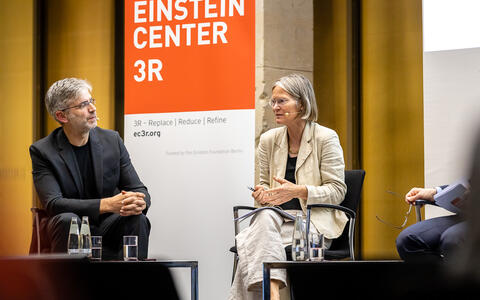Is animal research ethically justifiable?
Animal research is a sensitive topic. While many animal welfare organizations want it to be abolished outright, researchers argue that the experiments are crucial for understanding complex physiological processes and advancing drug discovery.
As well as developing alternatives to animal testing, the Einstein Center 3R also aims to bring more objectivity to the often highly emotional debates surrounding animal testing. With this in mind, it held a panel discussion on October 10, 2022, which asked: Is animal research ethically justifiable? The panelists were Steffen Augsberg, Professor of Public Law at Justus Liebig University Giessen and member of the German Ethics Council; Professor Michael Gotthardt of the Max Delbrück Center; Professor Stefan Hippenstiel of Charité – Universitätsmedizin Berlin and speaker of the Einstein Center 3R; and Professor Anne Peters, director of the Max Planck Institute for Comparative Public Law and International Law.
Replace, reduce, refine
Jens Kurreck, Professor of Applied Biochemistry at Technische Universität Berlin and co-speaker of the Einstein Center 3R, was the host for the evening. In his opening speech, he explained that the “3R” in the center’s name stands for “replace,” “reduce,” and “refine.” This means that if a scientific question can be answered with an alternative method, then no animal research must take place (replace); if there is no alternative, researchers must use only as many animals as is absolutely necessary (reduce); and they must design the experiments so that the animals are put under as little stress as possible (refine). In Germany, animal experiments only receive approval if they comply with the 3Rs.
Opening his keynote speech, Augsberg, an expert in constitutional law and animal ethics, noted that humans have a long tradition of making animals their own. Despite not viewing humans and animals as equals – “when pushed, we’ll choose a human life over an animal’s,” – we still see animals as moral objects that deserve respect and protection. With animal research in particular, we differentiate between lower and higher species and assign them different capacities for suffering. Differentiating like this is not only permissible, said Augsberg, it’s necessary. It’s also why many people can accept research being done on fruit flies, fish and even mice – but not on primates. But if we grant ourselves the right to use animals like this, we must also apply a special duty of care. Every animal experiment must be evaluated to assess whether its outcome will justify the animal’s suffering. Viewed this way, animal experiments can only be carried out when they are absolutely necessary – in particular, when human health is at stake. They must not be performed in order to save money or simply to test cosmetics.
3R is a dynamic process
The 3Rs are therefore a basic condition for animal research, said Augsberg. But they must not be seen as a finished product; instead, they are a work in progress, a dynamic process that is continually evolving. “We mustn’t settle for what we have achieved so far,” said Augsberg. “The 3R approach makes animal experiments the absolute exception – so it’s pushing for them to be replaced entirely.” This could potentially serve as a model for other types of human-animal relationships.
Michael Gotthardt and Anne Peters in discussion.
In the subsequent discussion, Peters reported that some countries give animals a basic right to life. Her research focuses in part on global animal rights. While she noted that the state does protect animal interests, it only does so in the form of objective property rights. A right to life for animals would have the potential to curb violence against animals worldwide, but Peters also stressed that granting this right would not mean that animals could no longer be used for research – especially as Germany’s animal welfare legislation already prioritizes basic research. She would, however, like to see more support for research into alternatives: “According to some estimates, Germany has spent just five million euros on developing alternative methods in recent years. That’s an absurdly small amount.”
An ethical dilemma for scientists
Without animal research, we’d be unable to gain certain insights into the molecular mechanisms of diseases or into how drugs work.
Gotthardt, who leads the Neuromuscular and Cardiovascular Cell Biology Lab at the Max Delbrück Center, stressed that scientists have a vested interest in keeping animal suffering to an absolute minimum: “Every time an animal suffers unnecessary stress in an experiment, it can distort the results.” Gotthardt explained that whenever he submits an application for an animal experiment, he has to show how the animals will be protected from undue stress. He also pointed out that scientists don’t want to harm their animals. He and his team use artificial heart tissue to reduce the number of animal experiments they carry out. But they still face an ethical dilemma: “Without animal research, we’d be unable to gain certain insights into the molecular mechanisms of diseases or into how drugs work.” While animal experiments do cause discomfort, he feels a much greater sense of discomfort when he is unable to help a patient. And even knowledge about organoids – alternative methods that the Einstein Center 3R is also working on – was gained through animal research.
Hippenstiel of Charité – Universitätsmedizin Berlin said that, regardless of whether scientists were doing research on organoids or animals, they were still all just models. And models are neither an accurate reflection of reality, nor are they immune to misinterpretation. Scientists have to tolerate that fuzziness – and always assess whether animal experiments or alternative methods will deliver the better results. He stressed that 3R wasn’t about stopping animal research entirely, but about creating useful models that will allow scientists to reduce animal experiments to the bare minimum.
Comments from the audience and by speakers recorded on video reflected how charged a topic animal research can be: Some felt that there wasn’t a lack of alternatives for animal experiments, just a lack of willingness to use them. Others said that if a drug has been developed using animal testing, it should be noted on the packaging (this is already the law for all drugs sold in Germany). Presented with the idea of testing drugs on humans right away, Augsberg warned that this would also be ethically fraught: “We’d have to ask ourselves who we’d test them on. Us?”
The panel discussion did not lead to a consensus – but it did foster an open and balanced exchange of views. Which was, after all, the aim of the event.






